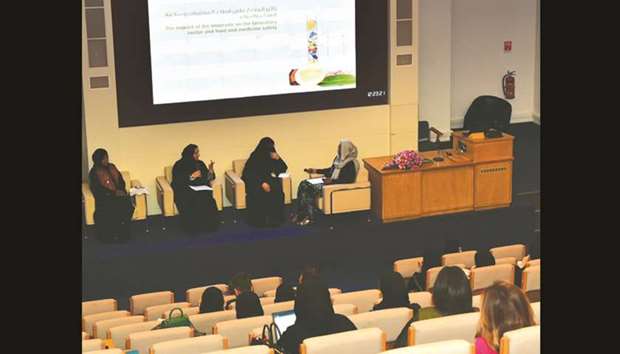Qatar University College of Health Sciences (QU-CHS) has hosted a seminar on “The Impact of the Blockade on the Laboratory Sector, Food and Medicine Safety.”
The seminar is part of QU’s series of events addressing Qatar’s blockade. It was delivered by Hamad Medical Corporation’s (HMC) assistant director of medical supplies Dr Zakia Mohammed al-Baloushi, medical laboratories supervisor Mona Sultan, and Ministry of Public Health’s Food Safety and Environmental Health division manager Wasan al-Baker.
Attendees included CHS dean and Biomedical Research Centre director Prof Asma al-Thani and CHS associate dean for academic affairs Dr Ahmad Malki as well as CHS department heads, faculty, staff and students.
Dr al-Baloushi discussed the impact of the blockade on medicine safety. She highlighted the commitment of HMC to purchase medicines from around the world and their distribution across HMC hospitals.
She also underlined the importance of securing a higher stock for several months and of manufacturing medicines locally in line with the highest quality standards.
Sultan noted that HMC established and implemented a strategic plan to address cases of crisis and emergency, adding that laboratories were supplied with the necessary equipment through supportive countries.
On food safety, al-Baker noted that the blockade contributed to accelerating the plans and strategies that support the achievement of economic independence and food self-
sufficiency.
She pointed to the role of the private sector in facilitating the procedures of new domestic investments and the emergence of integrated initiatives to promote food industry and agricultural projects in line with the goals of Qatar National
Vision 2030.
Al-Baker also indicated that due to the emergency plan implemented on June 5, the blockade did not have any negative impact on the food sector.
Prof Asma al-Thani said, “The health sector in Qatar has a great impact on the lives of the individuals, the society and the academic field. During the blockade, CHS continued in its efforts to support the community and show its students the impact of the blockade on the laboratory sector, pharmaceutical supplies and food safety. This seminar demonstrates how the country faced the crises through its wise leadership and the hard work of its
citizens.”

Panellists at the seminar.
